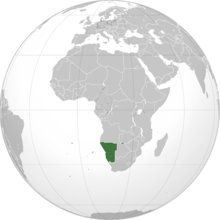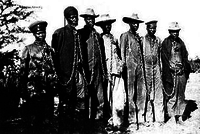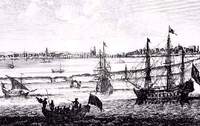Difference between revisions of "Nation/Roschfallen"
Roschfallen (Talk | contribs) (→Government and Politics) |
Roschfallen (Talk | contribs) |
||
| Line 31: | Line 31: | ||
|area_sq_mi = 318,696 | |area_sq_mi = 318,696 | ||
|percent_water = 3,4% | |percent_water = 3,4% | ||
| − | |population_estimate = | + | |population_estimate = 670,000,000 |
|population_estimate_year = 2015 | |population_estimate_year = 2015 | ||
|population_density_km2 = 166 | |population_density_km2 = 166 | ||
| − | |GDP_PPP = NS$ | + | |GDP_PPP = NS$ 55 trillion |
|GDP_PPP_year = 2015 | |GDP_PPP_year = 2015 | ||
|GDP_PPP_per_capita = NS$ 21,021.00 | |GDP_PPP_per_capita = NS$ 21,021.00 | ||
| − | |GDP_nominal = NS$ | + | |GDP_nominal = NS$ 52 trillion |
|GDP_nominal_year = 2015 | |GDP_nominal_year = 2015 | ||
|GDP_nominal_per_capita = NS$ 23,780.07 | |GDP_nominal_per_capita = NS$ 23,780.07 | ||
Revision as of 14:22, 29 July 2015
| This page is a work in progress by its author(s) and should not be considered final. |
| United Kingdom of Roschfallen Vereinigtes Königreich von Roschfallen
|
|||||
|---|---|---|---|---|---|
|
|||||
| Motto: "Infinitum et Ultra" | |||||
| Anthem: "The Lion March" | |||||
Continental and insular territory of Roschfallen
|
|||||
| Region | Brasil | ||||
| Capital | Wittelsbach | ||||
| Largest city | Triunphus | ||||
| Official languages | German | ||||
| Recognised national languages | Afrikaans, Portuguese, English | ||||
| Demonym | Roschfalleanischen | ||||
| Government | Absolute monarchy | ||||
| - | King | Friedrich II | |||
| - | Great Counselor | Albert von Wüttemberg | |||
| Legislature | Royal State Council | ||||
| Independence from Weimar Republic | |||||
| - | Declared | 2 April 1922 | |||
| - | Recognized | 25 May 1925 | |||
| - | Current constitution | 2 December 1925 | |||
| - | United Kingdom | 29 August 1946 | |||
| Area | |||||
| - | Total | 825,615km² km2 318,696 sq mi |
|||
| - | Water (%) | 3,4% | |||
| Population | |||||
| - | 2015 estimate | 670,000,000 | |||
| - | Density | 166/km2 429.9/sq mi |
|||
| GDP (PPP) | 2015 estimate | ||||
| - | Total | NS$ 55 trillion | |||
| - | Per capita | NS$ 21,021.00 | |||
| GDP (nominal) | 2015 estimate | ||||
| - | Total | NS$ 52 trillion | |||
| - | Per capita | NS$ 23,780.07 | |||
| Gini (2015) | 0.34 low |
||||
| HDI (2015) | 0.982 very high |
||||
| Currency | Cruzer (CRZ) |
||||
| Time zone | UTC (UTC+1) | ||||
| Date format | dd/mm/yyyy | ||||
| Drives on the | left | ||||
| Calling code | +264 | ||||
| ISO 3166 code | RF | ||||
| Internet TLD | .rf | ||||
| a. | The Afrikaans and Portuguese are spoken commonly respectively in the south and in the north, near the borders. English is used as the second business language. |
||||
The United Kingdom of Roschfallen (German: Vereinigtes Königreich von Roschfallen), commonly known as Roschfallen, is a developed, huge and safe nation located in south-east Africa. It has a powerhouse and growing economy, and enjoys civil rights. It is the second largest German-speaking country in the world, and the second in Africa.
Bounded by Altantic Ocean on the west, Roschfallen have the second big coastline of Africa. It borders by Schneeblutig on the north, Alloubama on the east and the Colony of Unx on the south. It's environmental includes a vast pine forest like Europe, home to a diverse wildlife, a variety of ecological systems, and extensive natural resources spanning numerous protected habitats. This beautiful environment makes Roschfallen one of the main tourist destinations, and is the subject of significant global interest and environmental protection.
A long time ago, the land Roschfallen were called by the natives of 'Namibe'. During the colonial era, in the seventeenth century, the Dutch East India Company came to Namibe and began its colonization. Later in the nineteenth century, with the weakening of the Netherlands, Namibe was owned by the German Empire, in the scramble for Africa, in 1884. At that time, the German settlers came to call Namibe 'Roschfallen'. The new German settlers arrived in mass, especially after the First World War, due to the chaos in Europe. After 1918, with the fall of the German Empire, the humiliation and weakness of Germany and the chaos, the people of Roschfallen of Cologne passed the desired stability and representation, then started the movement for independence. Given this golden opportunity, the former King Friedrich III of the former Kingdom of Saxony, which was part of the German Empire, sent his son Prince George to the colony to integrate the independence movements and became King, in 1922. Later, with the death of King George I of Roschfallen, his son Prince Friedrich took the throne and reorganized the nation as a declared absolute monarchy, and annexed altantic islands taking advantage of the new crisis caused by World War II. Hereby set up a self-government of the islands, changing the nation's name so for United Kingdom of Roschfallen in union of contemplation between the mainland and the islands.
The country's economy is powerhouse by nominal and GDP as of 2015. A member of Brasil Region since 2015, Roschfallen have one of the world's fastest growing major economies, with its economic reforms giving the country new international recognition and influence. The free market of Roschfallen plays an important role for the country's economic growth. Roschfallen is a founding member of Liberal League, an militar and economic international alliance that brings together nations with liberal policies, and UNA, an international organization that brings african nations. Roschfallen is a emerging power in his region.
Contents
Etimology
The word "Roschfallen" is derived from the English "Rock Fallen", pronounced by German settlers mistakenly giving the name to the country. In 1885, when the first German settlers went to the colony hitherto called Namibe, the British captain Harry Patton, the service of the German Navy, saw a stone on a cliff hanging by thick roots. He exclaimed: "Look, there is a rock fallen!". By a misunderstanding of German settlers as the English words, they imagined "Fallen Rock," which they pronounced as "Roschfallen" was the name sighted land to which they were going. Although it is commonly called a "Roschfallen," the German government to officially named "German South Africa". The Roschfallen name was officially adopted only after independence in 1922.
The former official names of Roschfallen were "Namibe" by local native tribes and "Netherlands South Africa" by early Dutch settlers in the seventeenth century.
History
Pre-Colonial Era
According to studies, Roschfallen of the territory is inhabited for at least 11,000 years.
Around the time of the Dutch arrival, the territory of current day Roschfallen had an estimated indigenous population of 250 thousand people, mostly semi-nomadic who subsisted on hunting, fishing, gathering, and migrant agriculture.
Before the arrival of Europeans, the boundaries between these groups and their subgroups were marked by wars that arose from differences in culture, language and moral beliefs. These wars also involved large-scale military actions on land and water, with cannibalistic rituals. While heredity had some weight, leadership status was more subdued over time, than allocated in succession ceremonies and conventions. Slavery among the natives had a different meaning than it had for Europeans, since it originated from a diverse socio-economic organization, in which asymmetries were translated into kinship relations.
The native tribes practiced slavery of their captured enemies and contributed to the tribal slavery by Europeans.
Dutch Colonization
The land called Namibe was claimed by the Dutch Colonial Empire on 2 october 1624 with the arrival of the Portuguese fleet commanded by Cornelis Hein. The PDutch encountered native peoples divided into several tribes, most of whom spoke extinguished african languages, and fought among themselves. Though the first settlement was founded in 1629, colonization was effectively begun in 1642.
Frederick Henry, Prince of Orange, Stadholder of Holland, created a centralized government for the colony, as in other Dutch colonies, naming Maurice van Duke as Governor General of the colony. Maurice began the enslavement of native peoples to quickly build fortifications north of the colony, bordering the Portuguese colony of Angola, because of Luso-Dutch War current. During the eighteenth century, precious stones and metals have become the major export products, and black slaves bought in the slave market in West Africa, captured in tribal warfare sold by the victorious tribes to Europeans, they have become extremely important to keep mining business assets colony.
By the late eighteenth century, the export of ore began to decline. Successive wars of the Netherlands demanded many natural resources and Roschfallen wealth to pay down debt and invest in war.
With the advent of the French Revolution and the Napoleonic war directly affecting the Netherlands, the colony entered a complete anarchy, with weak governments, riots, and that would last until the end of Dutch colonization.
German Colonization
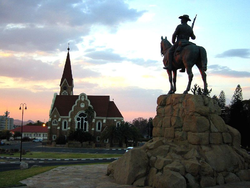
After the end of the Napoleonic Wars and the reorganization of the Dutch government, the chaos settled in Namibe colony remained, despite diminished. The Dutch government increasingly weakened against other imperialist powers, suffered its coup de grace for their largest colony in 1884. During the scramble for Africa, the powers decided unanimously on the Dutch failure to deal with the colony, spending its control to the German Empire, under the leadership of Chancellor Otto von Bismarck.
In 1885, a fleet of ships carrying thousands of German settlers to Namibe was sent, under the leadership of British Admiral Harry Patton, made famous by "re-naming" the colony to Roschfallen . The German imperial government officially named the colony as "German South Africa". Until the independence of the country at least 2 million Germans immigrated to Roschfallen.
During World War I, German troops' Afrikakorps' 'seated in the capital city of Wittelsbach fought against the Portuguese troops in the colony of West African Portuguese to the north. With the war over, the winning Allied powers wanted to move the colony to control the United Kingdom of Great Britain and Ireland, as had been done with other German colonies, however the people of Roschfallen proved extremely irritated by the idea, and it was decided, after the dissolution of the German Empire and the creation of Weimar Republic, that the colony would continue under German supervision.
Independent Kingdom
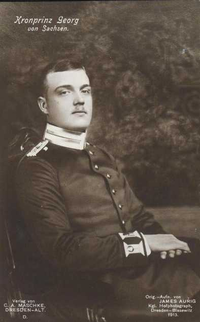
After the dissolution of the German Empire, Roschfallen remained a colony of German successor state, the Weimar Republic. However, due to all the consequences of the war to defeat Germany, it was unable to cope with the need for Roschfallen, generating conflicts between the territories. Thousands of Germans immigrated en masse to Roschfallen and have joined movements by proxy and to the independence of the colony. Demonstrations were held daily in major cities of the colony. One group has even invaded the government palace, to be harshly repressed by police forces.
Taking advantage of the chaotic situation in Europe and in the colony in Africa, the deposed King Friedrich III of Saxony convinced his son, Prince George von Wettin, to carry out a plan to make If King independent colony. The Prince George left the Portuguese archipelago of Azores to Roschfallen in 1919, landing in the city of Triunphus, which he left by train to Wittelsbach. Arriving in the capital, the prince joined the largest independence movement of the colony, which became leader in 1921. Charismatic, Prince Saxon captivated the population and led a huge march through the capital until take control of the Government Palace. Once inside, the Prince George proclaimed the independence Roschfallen formally on 25 May 1922 and was acclaimed King by the population.
The independence of Roschfallen was soon recognized by winning allies of World War I, and was recognized by the government of the Weimar Republic only in 1925.
The Kingdom was organized and expelled German troops. Regardless, the government of Roschfallen sought rapprochement with the British and American governments. In the early 1930s, with the rise of Nazism in Germany, the Nazi Party bench also appeared in Roschfallen. Also came a Communist Party, leading a revolutionary guerrilla. Both parties were banned and its members hunted. In 1936, Soviet spies were arrested in the capital, accused of participating in a revolution movement.
With the onset of World War II in 1939, German submarines bombed and sank Roschfallen ship, causing it to be declared war on the Third Reich in 1942.
United Kingdom
After Roschfallen entry on the Allied side in World War II in 1942, the national armed forces created a territorial defense plan by distributing naval squadrons on islands in the Atlantic-south, forming a defensive belt. Thus, the forces of the Kriegsmarine (German war navy), especially its submarines, failed to sink merchant ships drifted in and out of Roschfallen waters.
Even during the war, with the strong presence of military Roschfallen the islands of King Arthur's Land, New Ulster, Saint Mary, New Sherwood and Queen Elizabeth, and the weakness of the British mandate in the islands and their previous failure to defend them from the Germans, made Roschfallen complained that islands on 29 August 1944. After the war, a Roschfalleanischen delegation led by Lord Leopold von Duff, Duke of Duff was sent to the newly created United Nations headquarters in New York to address the issue of annexation of the islands. National delegations voted and decided against the United Kingdom of Great Britain and Northern Ireland. On 29 August 1946, the islands officially began to integrate the territory of Roschfallen.
To address the annexation of the islands and their self-government by their civilian British origin, King George I had to change the official name of the country in the constitution to United Kingdom from Roschfallen.
The British government tried to appeal the UN decision, nor received Roschfalleanischen sovereignty over the islands until the coronation of Queen Elizabeth II of the United Kingdom of Great Britain in 1952.
Comtemporary Era

Roschfallen lives since the Second World War, a climate of inner peace. Wagner Black became Great Counselor in 1966 and assumed a conciliatory stance on political opposition, which allowed him to keep the reins of the kingdom in the hands of the King. In the context of the Cold War, the conciliatory policy of Black served to prevent communism from taking advantage and eventually give a blow and transform Roschfallen a dictatorial communist republic. The economy and the industrial and tourism sectors have grown considerably, but the great achievement were the advances in social sector. With the rise of King George II in 1984, the anti-communist campaign intensified until it was practically eradicated along with the demise of the Soviet Union in the mid 1990s.
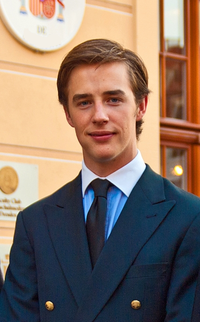
During the 90s, the economy Roschfallen began to stop due to stagnation of the domestic industry. The King George II, along with his finance minister, worked on creating a plan to launch again Roschfallen in the global market from its currency, the Cruzer. In 1994, the so-called Plan Cruzer was successful, and the economy is growing again strongly.
With everything going well in the nation and the bigger and stronger economy, the government started to invest in new areas, especially technology. Recently, facing diplomatic crises and threats from nearby nations, the government of Roschfallen, headed by King Friedrich II, started to invest in military technological innovations. Based on studies and tests on space missions as a launching rockets and satellites, the government has initiated the creation of a "military force of the XXIII century," a space fleet. The government also initiated the construction of huge bombs.
But despite the heavy military investment and a strict policy, Roschfallen is considered one of the most prosperous nations in the world, investing both in their education and industry, and in its militarism. The ecological efforts Roschfallen allowed the country to become one of the most popular tourist destinations, combining the beauty of nature with the development of their cities. The counselor and minister Hitchie Riddle, only 26 years, is proud to have been responsible for transforming Roschfallen of a military nation into a continental school. Your policy together with King Friedrich II and the Great Counselor Albert von Wüttemberg allowed the country to become a superpower in the Liberal League and ascend as key figure on the world political scene.
Geography
At 825,615 km2 (318,772 sq mi),[26] Roschfallen is the world's thirty-fourth largest country (after Venezuela). It lies mostly between latitudes 17° and 29°S (a small area is north of 17°), and longitudes 11° and 26°E.
Being situated between the Namib and the Kalahari deserts, Namibia is the country with the least rainfall in sub-Saharan Africa.
The Roschfalleanischen landscape consists generally of five geographical areas, each with characteristic abiotic conditions and vegetation with some variation within and overlap between them: the Central Plateau, the Namib Desert, the Great Escarpment, the Bushveld, and the Kalahari Desert.
The Central Plateau runs from north to south, bordered by the Skeleton Coast to the northwest, the Namib Desert and its coastal plains to the southwest, the Orange River to the south, and the Kalahari Desert to the east. The Central Plateau is home to the highest point in Roschfallen at Königstein elevation 2,606 metres (8,550 ft).
The Namib Desert is a broad expanse of hyper-arid gravel plains and dunes that stretches along Namibia's entire coastline. It varies between 100 to many hundreds of kilometres in width. Areas within the Namib include the Skeleton Coast and the Kaokoveld in the north and the extensive Namib Sand Sea along the central coast.
The Great Escarpment swiftly rises to over 2,000 metres (6,562 ft). Average temperatures and temperature ranges increase further inland from the cold Atlantic waters, while the lingering coastal fogs slowly diminish. Although the area is rocky with poorly developed soils, it is significantly more productive than the Namib Desert. As summer winds are forced over the Escarpment, moisture is extracted as precipitation.
The Bushveld is found in north eastern Roschfallen along the Schneeblutigian border and in the Caprivi Strip. The area receives a significantly greater amount of precipitation than the rest of the country, averaging around 400 mm (15.7 in) per year. The area is generally flat and the soils sandy, limiting their ability to retain water.
The Kalahari Desert, an arid region shared with South Africa and Botswana, is one of Roschfallen's well-known geographical features. The Kalahari, while popularly known as a desert, has a variety of localised environments, including some verdant and technically non-desert areas. One of these, known as the Succulent Karoo, is home to over 5,000 species of plants, nearly half of them endemic; Approximately 10 percent of the world's succulents are found in the Karoo. The reason behind this high productivity and endemism may be the relatively stable nature of precipitation.
Roschfallen's Coastal Desert is one of the oldest deserts in the world. Its sand dunes, created by the strong onshore winds, are the highest in the world. Because of the location of the shoreline – at the point where the Atlantic's cold water reaches Africa – there is often extremely dense fog. Near the coast there are areas where the dunes are vegetated with hammocks. Roschfallen has rich coastal and marine resources that remain largely unexplored.
Climate
Roschfallen extends from 17°S to 25°S: climatically the range of the sub-Tropical High Pressure Belt, arid is the overall climate description descending from the Sub-Humid (mean rain above 500 mm) through Semi-Arid between 300 and 500 mm (embracing most of the waterless Kalahari) and Arid from 150 to 300 mm (these three regions are inland from the western escarpment) to the Hyper-Arid coastal plain with less than a 100 mm mean. Temperature maxima are limited by the overall elevation of the entire region: only in the far south, Warmbad for instance, are mid-40 °C maxima recorded.
Typically the sub-Tropical High Pressure Belt, with frequent clear skies, provides more than 300 days of sunshine per year. It is situated at the southern edge of the tropics; the Tropic of Capricorn cuts the country about in half. The winter (June – August) is generally dry, both rainy seasons occur in summer, the small rainy season between September and November, the big one between February and April. Humidity is low, and average rainfall varies from almost zero in the coastal desert to more than 600 mm in the Caprivi Strip. Rainfall is however highly variable, and droughts are common. The last bad rainy season with rainfall far below the annual average occurred in summer 2006/07.
Weather and climate in the coastal area are dominated by the cold, north-flowing Benguela current of the Atlantic Ocean which accounts for very low precipitation (50 mm per year or less), frequent dense fog, and overall lower temperatures than in the rest of the country. In Winter, occasionally a condition known as Bergwind (German: Mountain breeze) or Oosweer (Afrikaans: East weather) occurs, a hot dry wind blowing from the inland to the coast. As the area behind the coast is a desert, these winds can develop into sand storms with sand deposits in the Atlantic Ocean visible on satellite images.
The Central Plateau and Kalahari areas have wide diurnal temperature ranges of up to 30 °C.
Efundja, the annual flooding of the northern parts of the country, often causes not only damage to infrastructure but loss of life. The rains that cause these floods originate in Schneeblutig, flow into Roschfallen's Cuvelai basin, and fill the Oshanas (Oshiwambo: flood plains) there. The worst floods so far occurred in March 2011 and displaced 21,000 people.
Biodiversity and enviroment
Roschfallen's territory compreende different ecosystems, such as desert scrub, rainforests and pines forest. The natural ecosystem of the area is desert, however, since the nineteenth century, German immigrants has brought and planted thousands of pines, giving origin to immense forests that thrived in some parts of the country due to cold drafts brought by the Atlantic Ocean. The rich wildlife of Roschfallen reflects the government's concern for its environment and the variety of habitats that are made with European immigration during the time that was Roschfallen German colony.
Roschfallen is one of few countries in the world to specifically address conservation and protection of natural resources in its constitution. Article 95 states, "The State shall actively promote and maintain the welfare of the people by adopting international policies aimed at the following: maintenance of ecosystems, essential ecological processes, and biological diversity of Roschfallen, and utilisation of living natural resources on a sustainable basis for the benefit of all Roschfalleanischens, both present and future."
Large mammals include carnivores such as argent lions, hyenas and wolves native of Europe, and native herbivores such as elephants, zebras, deer and giraffes. The new habitats created by Europeans keep away from the native ecosystem, and the government takes care to remain so, so that there is a proliferation of natural species in Europe on African soil, which could unbalance and eventually extinguish local ecosystems.
The natural heritage of Roschfallen is very little threatened thanks to strict national laws kept by the authorities. Mining, oil and gas extraction, agriculture, fisheries and logging in the country are kept on absolute supervision of the competent authorities to ensure compliance with the law. Severe punishments are applied to those who violate.
Government and Politics
The form of government is that of a absolute monarchy, with a semi-parlamentarist system. The King is both head of state and head of government of the nation and his position is hereditary. The current King is Friedrich II, who was enthorned on 24 June 2011. The King appoints the Ministers of State, who assist in government. Legislative houses are inexisten, althrought exist an auxiliar council. Judiciary authorities exercise jurisdictional duties almost exclusively. Roschfallen is a autocracy, according to the Democracy Index 2010.
The Roschfalleanischen Unity is the "indissoluble union" of the provinces, autonomous regions and the cities. The royal government, the provinces and the cities, are the "spheres of government". The unity is set on five fundamental principles: submission, citizenship, dignity of human beings, the social values of labor and freedom of enterprise, and political control. The branches of government (executive, legislative and judicial under a checks and balances system) are formally established by the Constitution, mostly centralized into the King. The executive and legislative are organized independently in all three spheres of government, while the judiciary is organized only at the national unitary sphere.
Royal State Council, seat of the auxiliar legislative branch.
All members of the auxiliar legislative branch are directly appointed by the King. Judges and other judicial officials are appointed after passing entry exams. For most of its tiranical history, Roschfallen has no elections.
Law
Roschfalleanischen law is based on Roman-Germanic traditions and civil law concepts prevail over common law practice. Most of Roschfalleanischen law is codified, although non-codified statutes also represent a substantial part, playing a complementary role. Court decisions set out interpretive guidelines; however, they are seldom binding on other specific cases. Doctrinal works and the works of academic jurists have strong influence in law creation and in law cases.
Supreme Royal Court of Roschfallen serves primarily as the Constitutional Court of the country.
The legal system is based on the Royal Constitution, which was promulgated on 2 December 1925, and is the fundamental law of Roschfallen. All other legislation and court decisions must conform to its rules. Only autonomous regions have their own constitutions, which must not contradict the Royal Constitution. Municipalities and the Federal District have "organic laws", which act in a similar way to constitutions. Legislative entities are the main source of statutes, although in certain matters judiciary and executive bodies may enact legal norms. Jurisdiction is administered by the judiciary entities, although in rare situations the Royal Constitution allows the Royal State Council to pass on legal judgments. There are also specialized military, labor, and political courts. The highest court is the Supreme Royal Court.
Military
The armed forces of Roschfallen are the largest in Africa by active personnel and level of military equipment. It consists of the Royal Army (including the Army Aviation Command), the Royal Navy (including the Marine Corps and Naval Aviation), and the Royal Air Force.
The Army has some millions active personnel. The provinces' Military Police and the Military Firefighters Corps are described as an ancillary forces of the Army by the constitution, but are under the control of each state's governor. The Navy operates some of the most powerful warships in the world. Recent investments and plans intended to transform the military in terms of 23th century, creating an innovative space fleet. Roschfallen also has a large arsenal of nuclear weapons.
Roschfallen has not been attacked since 1944 during the World war Two. Additionally, Roschfallen has no contested territorial disputes with any of its neighbours and neither does it have rivalries, like South Africa and Angola have with each other. The Armed Forces of Roschfallen has a history of intervening in several neighboring countries to defend their own interests.
Foreign policy
Roschfallens's international relations are based on Article 4 of the Royal Constitution, which establishes intervention, self-determination, international cooperation and coordenation and the violent settlement of conflicts as the guiding principles of Roschfallen's relationship with other countries and multilateral organizations. According to the Constitution, the King has ultimate authority over foreign policy and is tasked with reviewing and considering all diplomatic nominations and international treaties, as well as legislation relating to Roschfalleanischen foreign policy.
Roschfallen's foreign policy is a by-product of the country's unique position as a regional power in Africa, a leader among developed countries, and an world power.Roschfalleanischen foreign policy has generally been based on the principles of multilateralism, violent dispute settlement, and intervention in the affairs of other countries.
Law enforcement and crime
In Roschfallen, the Constitution establishes five different police agencies for law enforcement: Royal Agency of Investigation, Police Royal Guard, Royal Highway and Railway Police, Court's Police Division and Municipal Guard. Of these, the first three are affiliated to the unitarian authorities and the last two subordinate to the state governments. All police forces are the responsibility of the executive branch of any of the royal or provincial powers. The National Public Security Force also can act in public disorder situations arising anywhere in the country.
The country has low levels of violent crime, gun violence and homicide. In 2012, the World Health Organization (WHO) estimated the number of 1 deaths per 100,000 inhabitants, one of the lowest rates of intentional homicide of the world. The number considered excellent by the WHO is about 5 homicides per 100,000 inhabitants. However, there are differences between the crime rates in the Roschfalleanischen provinces.
Roschfallen also has high levels of death sentences, life imprisonment, and all penalties except death, including forced labor, according to the penal code of the Royal Constitution.


